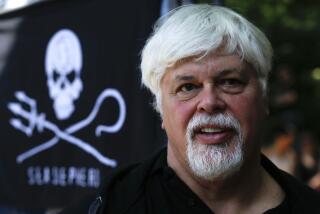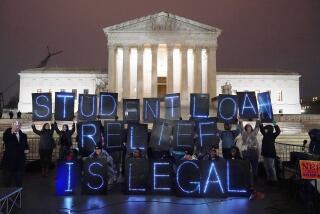Separatist Party Headed for Victory in Quebec Election
The Parti Quebecois, dedicated to winning Quebec’s independence from Canada, was headed for victory in the provincial election Monday, promising to bring a year of political turmoil to the United States’ northern neighbor.
Based on early returns, two television networks projected a parliamentary majority for the PQ, led by Jacques Parizeau, 64, who has promised to hold a referendum on Quebec independence within 10 months of taking office. Parizeau’s party would oust from office the ruling Liberal Party, led by Premier Daniel Johnson, 49.
Parizeau has indicated that he would immediately set the wheels in motion for a referendum if he became premier.
Among the plans he announced during the campaign were adoption by Quebec’s National Assembly of a “declaration of intent” to assume independence; appointment of a commission to draw up a constitution for the proposed new nation, and aggressive policies aimed at taking control of programs usually directed by the Canadian national government.
Separatists believe a Parti Quebecois victory would give them their best chance at independence, even though polls show that most Quebeckers now oppose separation from Canada. Their strategists contend they can reverse that trend with a vigorous Quebec government teamed with their separatist partners in the federal Parliament, the Bloc Quebecois, which holds 53 seats and is led by the charismatic Lucien Bouchard.
A surprise victory by the Liberals would have been a death blow to the separatist cause. Network projections showed the Liberals doing somewhat better than polls had indicated, but not well enough to win.
Canadian Prime Minister Jean Chretien, a Quebecker who strongly supports national unity, stayed out of the provincial election but is expected to play a stronger role in the referendum campaign.
Because Canada is the United States’ largest trading partner and a key defense ally, the United States has a major stake in the outcome of the separatist struggle. The traditional U.S. position has been to say Canada is a valued neighbor but that the issue of national unity is one for Canadians to decide. So far, the Clinton Administration has continued to adhere to that line.
While the Quebec campaign commanded Canadian and international attention because of the separatism issue, within the province the dominant issues were the economy, which only recently has begun to emerge from a long recession, and voters’ exhaustion with the Liberal government, polls show.
Indeed, sentiment for Quebec independence dropped steadily in the polls throughout the campaign, even as support for the PQ held steady or increased. The latest surveys showed Quebeckers opposed to secession from Canada by about 60% to 40%, the same margin by which a 1980 sovereignty referendum was defeated.
Johnson became premier in January, succeeding Robert Bourassa, who retired because of poor health. He inherited a government that was seen by many voters as uncaring about Quebec’s jobless and unwilling to do much to correct chronic, double-digit unemployment.
During the 50-day campaign, and in the months leading up to it, Johnson sought to reverse that by putting forward a new economic program and simultaneously warning that the Parti Quebecois’ focus on sovereignty would distract a Parizeau government from job creation.
In response, Parizeau argued that Quebec independence would be decided in the promised 1995 referendum and that this election was about good government. Parizeau also contended that independence is necessary for Quebec to achieve its economic potential, saying a PQ government would need all the tools of a sovereign nation to reach full employment.
Chretien’s absence from the campaign was criticized in some quarters. But federal election officials often stay out of provincial politics and Chretien is sensitive to complaints in the rest of Canada that the federal government pays too much attention to Quebec.
In any case, Chretien is far more popular outside of Quebec than within the province, and an appearance on behalf of Johnson might have backfired. Chretien was justice minister in the early 1980s and was instrumental in helping Prime Minister Pierre Elliott Trudeau enact a new Canadian constitution over the lone opposition of the Quebec government. Many Quebeckers never have forgiven Chretien.
Background on Quebec
The Quebec provincial election has launched a new debate over independence from Canada. Here are some key facts about Quebec:
* Size: Canada’s largest province in area at 594,440 square miles, roughly the size of Alaska.
* Population: Second-largest in population after Ontario, with 6.9 million people, or about a quarter of Canada’s total. About 82% speak French as their first language, 9% English and another 9% speak languages other than English or French.
* Economy: Comparable in size to Denmark. Quebec accounts for about 22.5% of Canada’s total economy measured by gross domestic product.
KEY DATES IN QUEBEC HISTORY
1534: Jacques Cartier sails up St. Lawrence River. French develop New France over next century.
1759: Quebec City, capital of New France, falls to the British in famous battle on the Plains of Abraham.
1763: Treaty of Paris. France cedes to Britain all North American possessions except St. Pierre and Miquelon.
1867: Canada, made up of Quebec, Ontario, New Brunswick and Nova Scotia, granted independence from Britain.
1967: French President Charles de Gaulle shouts, “Vive le Quebec libre!” from the balcony of Montreal City Hall, setting off wave of nationalist sentiment.
1976: Parti Quebecois--running on a platform of sovereignty--wins election for the first time.
1980: Referendum on whether Quebeckers want to grant provincial government a mandate to negotiate sovereignty-association with Canada rejected 60% to 40%.
1982: Prime Minister Pierre Elliott Trudeau repatriates Canadian constitution from Britain without Quebec assent. Other provinces sign it.
1990: Prime Minister Brian Mulroney’s hopes of reconciling Quebec with Canada dashed as Meech Lake constitutional accord among provinces and federal government is rejected.
1993: Canadian federal election: Mulroney’s Progressive Conservative Party under new leader Kim Campbell humiliated in sweeping victory by Jean Chretien’s Liberal Party. Pro-separatist Bloc Quebecois wins more votes than Liberals in Quebec and becomes official opposition party in Canadian Parliament.
Source: Reuters
More to Read
Sign up for Essential California
The most important California stories and recommendations in your inbox every morning.
You may occasionally receive promotional content from the Los Angeles Times.






